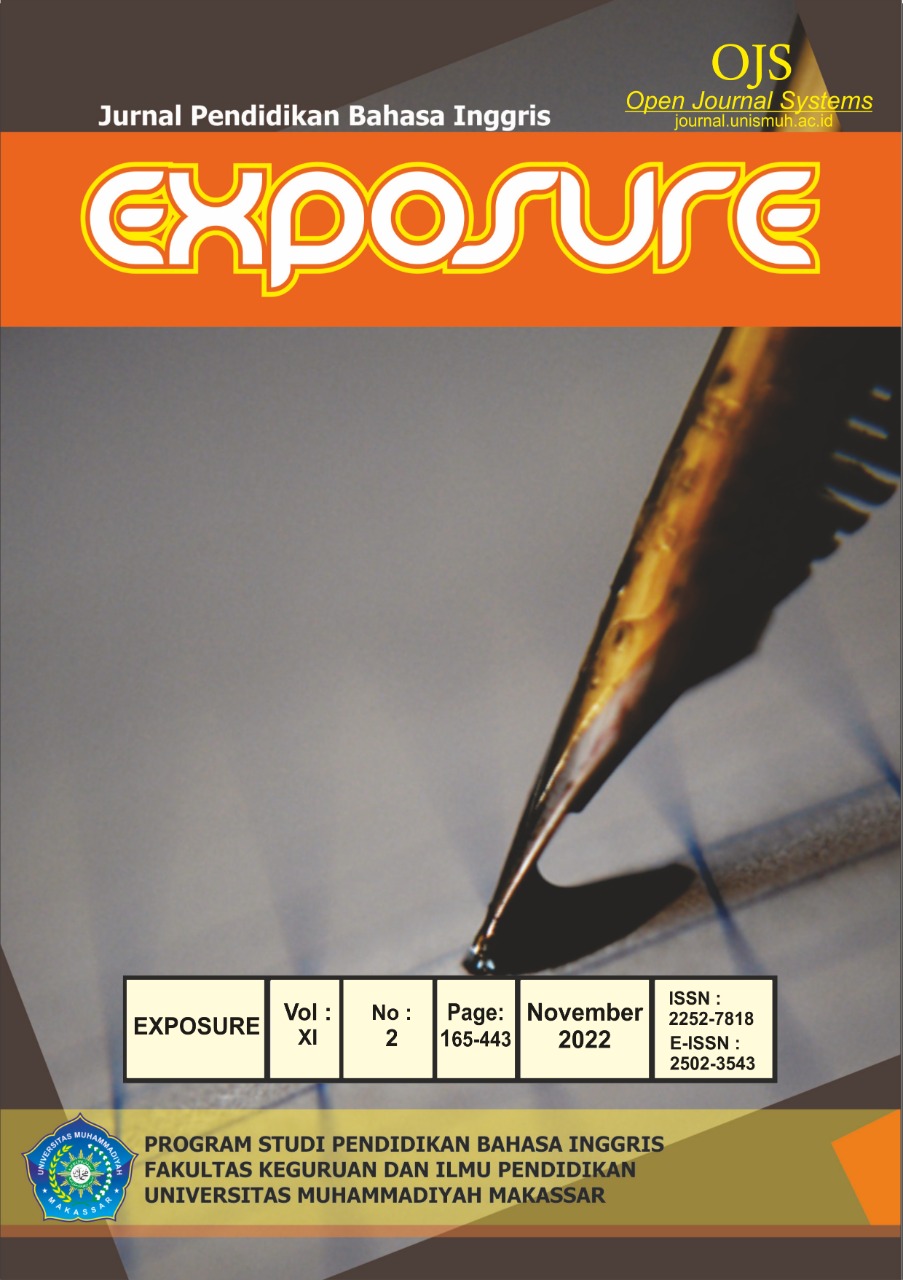THE IMPACT OF COVID-19 ERA ON THE STUDENTS’ ENGLISH COMMUNICATION
DOI:
https://doi.org/10.26618/exposure.v11i2.8901Keywords:
English, The Covid-19, communicationAbstract
This research was aimed at finding out the impact of the COVID-19 era on English students' communication skills at the University of Muhammadiyah Bone. This research was a descriptive qualitative design. The source data was from the students of the English education department. This research used a purposive sampling technique. The students were 20 and were taken from the English education department. The instruments of this research were interviews and questionnaires. The data from the students' interviews were transcribed and analyzed to answer the research question about the impact of the COVID-19 era on the English students' communication skills at the University of Muhammadiyah Bone. The results from the questionnaire showed that students mostly had a negative response to learning to speak during the COVID-19 period. The interview showed that the students' answers also gave negative responses toward the impact of the COVID-19 era on their English communication skills. It means that they want to learn to speak offline. They want to learn to speak with maximum support so that they do not feel bored easily or nervous about communicating. According to the data from both instruments, most students were not having fun, feeling confident, enjoying themselves, or being motivated to learn through online speaking. Furthermore, most want to learn to speak in a physical classroom rather than a virtual one.
References
Ahmadi, M. R. (2011). The effect of integrative and instrumental motivation on Iranian EFL learners ’ language learning. ELT Voices, April.
Arduini, R. G., De Oliveira Augusto, J. A., de Moraes, J. N. L., Stella, P. R. F., de Cassia Coutinho Vieira Fornasari, R., Ferreira, T. F. L., & Ciasca, S. M. (2021). Perceptions of Elementary School Students about Virtual Classes during Coronavirus (COVID-19) Pandemic in Brazil. Psychology, 12(09). https://doi.org/10.4236/psych.2021.129089
Atlam, E. S., Ewis, A., El-Raouf, M. M. A., Ghoneim, O., & Gad, I. (2022). A new approach in identifying the psychological impact of COVID-19 on university student’s academic performance. Alexandria Engineering Journal, 61(7), 5223–5233. https://doi.org/10.1016/j.aej.2021.10.046
Creswell, J. W. (2015). Educational Research: Planning, Conducting, and Evaluating Quantitative and Qualitative Research, Enhanced Pearson eText with Loose-Leaf Version--Access Card Package. Pearson Education, Inc.
Daniel, S. J. (2020). Education and the COVID-19 pandemic. Prospects, 49(1–2). https://doi.org/10.1007/s11125-020-09464-3
Fajar. R, Hamsia. W, Y. R. (2021). Online Learning for English Language Learners During Covid-19 Pandemic in Muhammadiyah University of Surabaya. Journal of Education and Practice. https://doi.org/10.7176/jep/12-9-10
Gunawan, Rahman, A. (2022). Teaching English Speaking Ability by Using Expression Like and Dislike through Dialogue. Journal of Indonesian Scholars for Social Research Copyright, 2(1), 1–5.
Irawan, A. W., Dwisona, D., & Lestari, M. (2020). Psychological Impacts of Students on Online Learning During the Pandemic COVID-19. KONSELI : Jurnal Bimbingan Dan Konseling (E-Journal), 7(1). https://doi.org/10.24042/kons.v7i1.6389
Rosali, E. S. (2020). AKTIFITAS PEMBELAJARAN DARING PADA MASA PANDEMI COVID-19 DI JURUSAN PENDIDIKAN GEOGRAFI UNIVERSITAS SILIWANGI TASIKMALAYA. Geography Science Education Journal (GEOSEE), 1(1).
Wibowo, A. I., & Khairunas, S. (2019). Improving Communication English Speaking Skill through Listening Practice for Non-English Majored Students. Wanastra: Jurnal Bahasa Dan Sastra, 11(2). https://doi.org/10.31294/w.v11i2.6204
Downloads
Published
Issue
Section
License
Authors who publish with this journal agree to the following terms:
In order to assure the highest standards for published articles, a peer review policy is applied. In pursue of the compliance with academic standards, all parties involved in the publishing process (the authors, the editors and the editorial board and the reviewers) agree to meet the responsibilities stated below in accordance to the Journal publication ethics and malpractice statement.
Duties of Authors:
- The author(s) warrant that the submitted article is an original work, which has not been previously published, and that they have obtained an agreement from any co-author(s) prior to the manuscript’s submission;
- The author(s) should not submit articles describing essentially the same research to more than one journal;
- The authors(s) make certain that the manuscript meets the terms of the Manuscript Submission Guideline regarding appropriate academic citation and that no copyright infringement occurs;
- The authors(s) should inform the editors about any conflict of interests and report any errors they subsequently, discover in their manuscript.
Duties of Editors and the Editorial Board:
- The editors, together with the editorial board, are responsible for deciding upon the publication or rejection of the submitted manuscripts based only on their originality, significance, and relevance to the domains of the journal;
- The editors evaluate the manuscripts compliance with academic criteria, the domains of the journal and the guidelines;
- The editors must at all times respect the confidentiality of any information pertaining to the submitted manuscripts;
- The editors assign the review of each manuscript to two reviewers chosen according to their domains of expertise. The editors must take into account any conflict of interest reported by the authors and the reviewers.
- The editors must ensure that the comments and recommendations of the reviewers are sent to the author(s) in due time and that the manuscripts are returned to the editors, who take the final decision to publish them or not.
Authors are permitted and encouraged to post online a pre-publication manuscript (but not the Publisher’s final formatted PDF version of the Work) in institutional repositories or on their Websites prior to and during the submission process, as it can lead to productive exchanges, as well as earlier and greater citation of published work (see The Effect of Open Access). Any such posting made before acceptance and publication of the Work shall be updated upon publication to include a reference to the Publisher-assigned DOI (Digital Object Identifier) and a link to the online abstract for the final published Work in the Journal.

